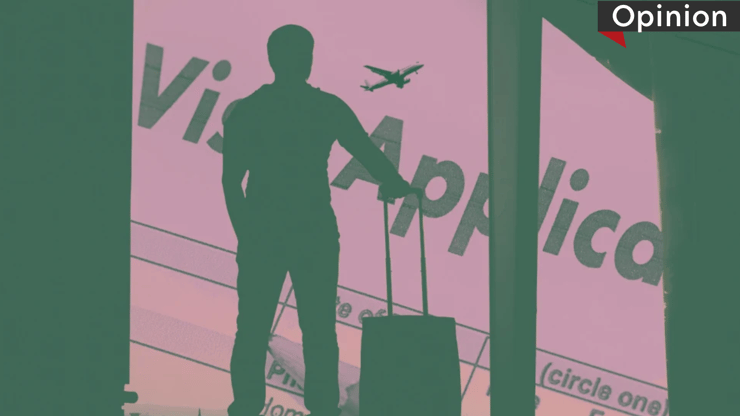Immigration NZ’s Troubling Visa Fee Logic

Recent comments by Immigration New Zealand (INZ) that businesses and migrants should not expect improved services despite a steep increase in visa fees have raised serious questions about the agency's priorities and accountability.
The rationale provided by INZ — that the fee hike was meant to shift costs from taxpayers to visa applicants and not to enhance service delivery — is not only disappointing but also troubling. At its core, it signals a refusal to tie increased revenue to better outcomes, which risks undermining public confidence and New Zealand’s competitive edge in attracting global talent.
The heart of the issue lies in INZ’s assertion that the increased visa fees do not translate into improved efficiency or service. This raises a critical question: if this additional revenue does not improve services, is it at least offsetting the taxpayer money currently funding INZ? Logically, the extra funds collected from migrants and businesses should reduce the burden on the government exchequer. However, there is no clarity on whether this is the case. Instead, INZ’s position suggests a “net zero” transaction where applicants pay significantly more but receive no better service. This disconnect between cost and value is a troubling precedent for a public agency.
One of the most glaring implications of this approach is its potential impact on New Zealand’s ability to attract global talent. Skilled migrants are essential to the nation’s economic growth, yet visa processing delays — which currently stretch beyond seven months for key work visas — already place New Zealand at a disadvantage.
The visa fee for an Accredited Employer Work Visa, for instance, recently jumped from $750 to $1,540. For businesses desperate to fill critical labour gaps, this added expense comes with no guarantee of faster or more efficient processing. This is a risky gamble in a world where countries like Canada and Australia are aggressively courting skilled migrants with streamlined, applicant-friendly systems.
Will prospective immigrants look elsewhere? The answer is likely yes. Other nations are investing heavily in reducing barriers to entry and improving applicant experiences, understanding that global talent is mobile and that reputation matters. New Zealand’s immigration system risks being perceived as overly bureaucratic, expensive, and slow — an image that could deter highly skilled professionals and investors.
At a deeper level, INZ’s reluctance to tie higher fees to improved efficiency is a troubling signal of complacency. Public agencies should constantly strive to optimise their processes and service delivery, especially when citizens and businesses are paying more for the same or lesser service. It is neither unreasonable nor unfair to expect improved outcomes when fees double.
The backlog of visa applications, slow processing times, and the “one-size-fits-all” approach to assessing visitor visa bonafides highlight systemic inefficiencies. For example, businesses relying on migrant workers to meet demand during the critical summer season face months-long delays that jeopardise their operations. The hospitality and tourism sectors, in particular, are at risk of losing a much-needed “bumper summer” if INZ cannot rise to the occasion.
While INZ has announced the addition of 33 new staff, this is widely regarded as insufficient to address the backlog. A deeper overhaul of processes, leveraging technology and adopting a more nuanced approach to visa assessments, is urgently needed.
At its core, this issue underscores a basic principle: when costs increase, expectations rise. This is not unique to immigration services; it is a fundamental aspect of any transaction. Visitors and visa applicants paying higher fees have every right to expect quicker turnaround times, more transparent processes, and better communication.
In its current state, the immigration system does little to inspire confidence. Complaints about inconsistent decision-making, excessive scrutiny of genuine visitors, and a lack of transparency have become alarmingly common. By decoupling the fee hike from service improvements, INZ appears tone-deaf to the frustrations of applicants, businesses, and industry stakeholders alike.
The implications of INZ’s approach extend far beyond visa fees. Immigration is a critical lever for economic growth, cultural exchange, and international reputation. A poorly managed system not only undermines these goals but also risks alienating communities that are vital to New Zealand’s social fabric and economic prosperity.
For businesses, migrants, and taxpayers alike, the question is simple: where is the value? INZ’s inability to answer this question convincingly reflects poorly on its leadership and priorities.
New Zealand deserves better from its immigration system. INZ must recognise that its mandate goes beyond cost recovery; it must also deliver timely, efficient, and applicant-friendly services. Achieving this will require a fundamental shift in mindset, with a renewed focus on process improvement, stakeholder engagement, and accountability.
As visa applicants bear a higher share of costs, INZ must commit to measurable improvements in service delivery. Clear timelines, greater transparency, and a customer-centric approach are non-negotiable in restoring faith in the system.
The government, too, must step in to ensure that INZ’s policies align with New Zealand’s broader goals of attracting global talent and fostering economic growth. Without meaningful reform, the cost of inefficiency will be far greater than any revenue gained from higher visa fees.
For now, businesses and migrants are left paying more and waiting longer — a frustrating reality that New Zealand can ill afford.





